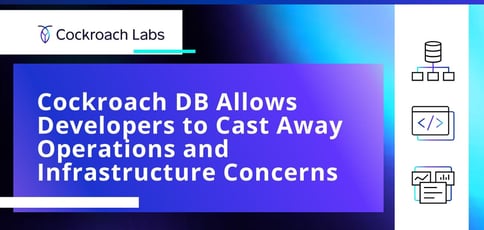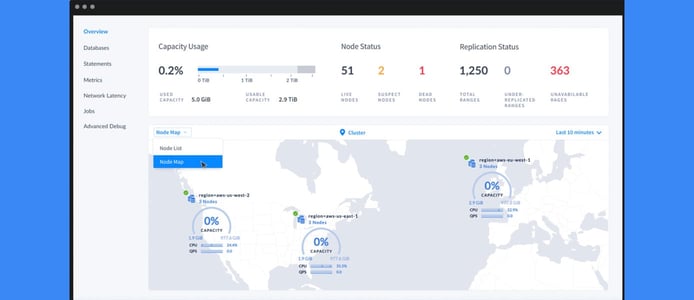
TL; DR: CockroachDB, a distributed SQL database developed by Cockroach Labs, is known for its resilience, data locality, scalability, and consistency. Part of an emerging third-generation of databases, the cloud-native solution is in production across thousands of data-intensive cloud applications and services. Cockroach Labs recently released the beta version of CockroachCloud Free, a no-cost cloud hosting service ideal for testing out CockroachDB and building hobby applications.
No matter what career we’ve chosen, most of us can relate to the psychological concept of flow, also known as being in the zone.
This highly focused mindset, formally recognized by psychologist Mihaly Csikszentmihalyi, is where we unlock peak creativity and productivity.
For developers, the zone is the best place for cranking out code. But getting there is a matter of eliminating distractions, particularly in terms of sysadmin tasks.
“Developers don’t want to deal with infrastructure,” said Peter Guagenti, CMO at Cockroach Labs. “They want to write code — not think about sharding, backups, or data residency.”
Peter told us that’s why programmers who work on data-intensive applications are turning to CockroachDB, a cloud-native distributed database known for boosting operational efficiency. The SQL solution, created by Cockroach Labs, automatically distributes data and workload demand, freeing developers from manual sharding and complex workarounds.

Peter Guagenti, CMO at Cockroach Labs, shared his company’s vision to make developers’ lives easier.
The aptly-named database technology is also built to handle unpredictability and survive machine, datacenter, and regional failures. With geo-partitioning to ensure top performance for local and global deployments and row-level controls for compliance with data privacy laws, it’s no wonder developers are flocking to CockroachDB.
“We have literally been unable to kill this thing,” Bose’s Dylan O’Mahony said about the database in an especially poignant testimonial on the Cockroach Labs site. “No matter what we’ve thrown at it.”
In addition to the free database, Cockroach Labs offers a Database-as-a-Service (DBaaS) solution hosted on AWS and Google Cloud. The company also recently released the beta version of CockroachCloud Free, a no-cost cloud hosting service intended for testing out CockroachDB and building hobby applications.
Cockroach Labs: The Company Behind the Database
Cockroach Labs was founded in 2015 by Spencer Kimball, Peter Mattis, and Ben Darnell. Peter and Spencer met as students at the University of California, Berkeley, where they invented the free and open-source GNU Image Manipulation Program (GIMP).
Upon graduating, Peter and Spencer joined Google, where Ben was working as a member of the Google Reader team.
“Google was really innovating infrastructure at the time,” Peter said. “They were trying to build breakthrough applications, and they knew the only way to do it was to provide shared services that let developers just be developers.”
The trio eventually decided to leave Google and start their own company, which they ended up selling. While pursuing that venture, they realized that they missed the database management tools they previously used at Google, such as Spanner.
The team wrote the first version of their own solution in January 2014 before releasing it as an open-source project on GitHub in February 2014. In 2019, they switched to a proprietary Business Source License (BSL). Today, CockroachDB core remains free to use, but some core features are subject to the Cockroach Community License (CCL) and third-party licenses.
“Fast forward to today, and we’re two years into revenue generation,” Peter said. “We were inducted into the JPMorgan Chase Hall of Innovation, and we’re working with big names like DoorDash. A lot of clients are saying, ‘This is the database infrastructure I’ve been looking for. Now that it’s available, I don’t have to go around patching things together from the first-gen relational databases with duct tape and baling wire.’”
The Third Generation of Database Technology
Developers are attracted to CockroachDB for numerous benefits, including quick scalability, cross compatibility, and customization. Peter said that the bulletproof insect the company is named for is perhaps the best indicator of its value proposition.
“We make it possible to scale rapidly, survive anything, and thrive everywhere,” Peter said. “At the same time, we’re the most highly evolved database on the planet, offering consistency, resiliency, locality, and scalability.”
Part of an emerging third-generation of databases, CockroachDB is appropriate for applications that demand accurate, available, and reliable data with millisecond response times. Use cases include cloud migrations, distributed or replicated online transaction processing, multidatacenter and multiregion deployments, and cloud-native infrastructure initiatives.
Peter said increased competition means there is zero market appetite for failure during any of these processes — and that’s no problem.
“We have had customers lose an entire datacenter without causing any issues for the end user — and that’s powerful,” he said. “Those of us who’ve been in this space long enough remember when you could have an outage for hours and nobody would be upset. That’s not the world we live in now.”
This type of perceptiveness is what makes companies like Comcast, Lush, and SpaceX trust Cockroach Labs. It’s also attracting investors, including Benchmark, G/V, Index Ventures, and Redpoint.
“We didn’t know it at the time, but one of our investors who came in during the last round did their research with a bunch of our customers,” Peter said. “After they were done, they came back to us and said, ‘We think you’re saving your customers probably 30% of their operational time, which is pretty significant.’”
Geo-Partitioning and Data Locality
CockroachDB’s built-in data locality feature makes developer’s lives easier by improving performance and ensuring compliance with privacy laws.
“One of our breakthroughs is in the locality,” Peter said. “CockroachDB is the world’s best global database. If you have an application that has to cross regions, we tend to win on the consistency, resiliency, and scalability.”
CockroachDB uses geo-partitioning to link data to a location, such as a country, region, city, state, or specific data center. This allows developers to control data locality in the database instead of requiring complex application logic and manual schema changes.

CockroachDB automatically distributes data and workload demand.
The granularity also provides audiences with low-latency data access in compliance with privacy regulations.
“We had a client who used another cloud database before coming to us,” Peter said. “They were having major outages as they grew globally. Now they can deploy their applications wherever they want without worrying about downtime or massive GDPR fine.”
Peter said both multinational companies and startups appreciate the fact that they no longer have to battle such cross-region data locality issues.
“That’s why we’re so popular with startups right now,” he said. “They simply don’t have time to worry about any of that nonsense.”
CockroachCloud Free — Now in Beta
In 2019, Cockroach Labs launched Cockroach Cloud, a paid service providing customers with the hosting infrastructure, maintenance, and management to support their CockroachDB projects.
Now, Cockroach Labs is anticipating a busy year ahead after launching CockroachCloud Free in beta.
“We’re hoping we can then support that next generation of app development,” Peter said. “We like to say internally that our mission is really to be the database of choice for your billion-dollar idea. Because we all have that vision or that dream that we want to pursue.”
In beta form, the free solution is currently well-suited for hobby projects and CockroachDB training.
“But by the end of this year, it’ll be opened up where people can start running production instances,” Peter said.
HostingAdvice.com is a free online resource that offers valuable content and comparison services to users. To keep this resource 100% free, we receive compensation from many of the offers listed on the site. Along with key review factors, this compensation may impact how and where products appear across the site (including, for example, the order in which they appear). HostingAdvice.com does not include the entire universe of available offers. Editorial opinions expressed on the site are strictly our own and are not provided, endorsed, or approved by advertisers.
Our site is committed to publishing independent, accurate content guided by strict editorial guidelines. Before articles and reviews are published on our site, they undergo a thorough review process performed by a team of independent editors and subject-matter experts to ensure the content’s accuracy, timeliness, and impartiality. Our editorial team is separate and independent of our site’s advertisers, and the opinions they express on our site are their own. To read more about our team members and their editorial backgrounds, please visit our site’s About page.

